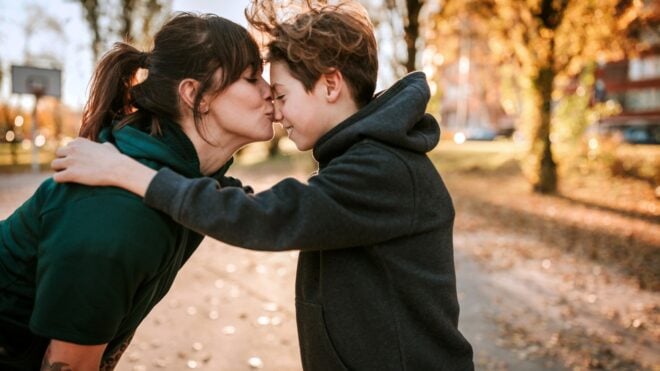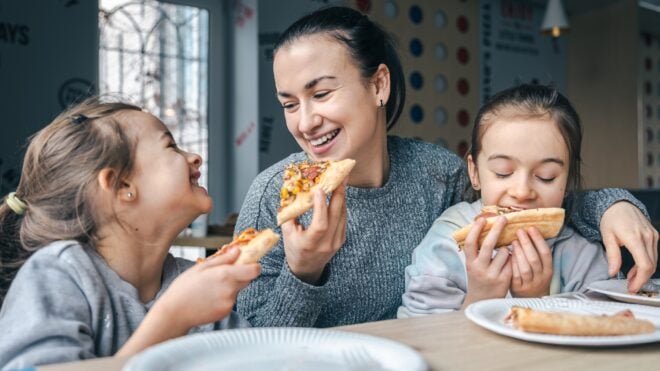
In this article
Hanukkah is the eight-day Jewish holiday that celebrates a rededication of faith. It commemorates the rededication of the Temple by the Maccabees in 165 BC after the Syrians desecrated it. The eight days are marked by festival lights on a menorah; with each sunset comes the lighting of a new candle. It isn’t meant to be a socially distanced holiday, but will need to be that way in 2020 due to COVID.
Hanukkah 2020 starts on December 10 and runs through December 18. For many, celebrating this year will look a little different than in years past, with the CDC recommending to keep gatherings small and among only those who are in your same household. This will be a year where you don't want to host a dinner but instead keep things within your nuclear family.
“Tell kids how special it is to be all together,” mom of seven Sara Chana Silverstein told Mom.com. This can help kids weary of the lockdown better understand that they aren’t alone and it’s part of their history. She continued, “During the Hanukkah story, the Maccabees stayed in a cave together and got along beautifully. Try to imagine what our warriors of old experienced!”
Traditional food at Hanukkah

Food is an important part of the Hanukkah celebration. “During COVID, we all have to work even harder and be even more creative, because our spirits are weighed down by restrictions. Luckily, Hanukkah foods are not being restricted,” Rabbi Judith Greenfeld told Mom.com.
Many of the traditional foods eaten during Hanukkah are fried in oil to represent the oil the Maccabees had that lasted eight days. Another popular food is cheese or recipes that contain dairy to celebrate Judith’s victory that urged the Israelites to launch a surprise attack in Bethulia.
Traditional foods include loukoumades, which are deep-fried puffs dipped in honey representing what the Maccabees ate. Latkes, a potato pancake, are another popular food at Hanukkah. Sufganiyot is a jelly-filled donut that is also commonly made to enjoy. While the olive oil represents the oil needed to keep the menorah lit, the heavy foods were easily made and consumed before battle.
But today’s families will have much more on the dinner table than deep-fried desserts. Many will enjoy a brisket that is slow-cooked to make what is otherwise a tough meat tender and juicy. Cream of artichoke soup is another dinner item to honor Judith. No Hanukkah dinner table would be complete without challah and matzo ball soup.
New traditions: Online and virtual Hanukkah dinner

The idea of a virtual Hanukkah celebration doesn’t appeal to everyone. It’s natural to want to gather generations of family together for this holiday. This won't be practical this year, as new waves of COVID-19 threaten households around the country. But that doesn’t mean you can’t have meaningful moments via Zoom.
Think about the family patriarch giving the Hanukkah prayer before dinner via Zoom where multiple families get to hear it. Have the kids make latkes with grandma via a video call, learning her special tips to make them perfectly. Have kids put on a Hanukkah play retelling the amazing story of their ancestors for friends and family virtually via Zoom.
Take the time to drop off some homemade desserts to family and friends who can’t come to your home to celebrate — drop-off sharing is still COVID-responsible and can make someone who is alone for the holiday feel loved and included.
To further protect your family, think about ordering ingredients/supplies to be delivered to avoid shopping where feasible. Don't forget to support local businesses in the process to feel good about bulding community. In fact, many restaurants are offering take-out Hanukkah meals making food preparation easy. Check with local restaurants or in community Facebook groups to see who might be providing Hanukkah meals for takeout and/or delivery.
What to do about Hanukkah gifts

Getting gelt is thought to be a symbol of the holiday because the independence gained by Jewish ancestors meant they could make their own coins. Gifts were not part of the Maccabees story. In fact, gift giving is a new tradition for Jews. It is said to have started in the 1950s to help post-Holocaust Jewish children feel happy to be Jewish when the holiday competes with Christmas and Santa Claus giving children presents.
It can be hard for parents to not get lost in trying to make Hanukkah like Christmas. But while giving your children gifts for the holiday, remember the spirit of the holiday is in the miracle of the oil and the success of the Maccabees. Remind your children that they are not missing out on Christmas, but are instead able to celebrate a grand history passed down from one generation to the next.
That isn’t to say that you can’t give gelt and a special present or two during the holiday week. If you choose to give a gift for every night of Hanukkah, think about making them something meant to be done as a family, such as a board game. By making the holiday about the traditions instead of the gifts — especialy during these difficult times — you help your children find a deeper spiritual and family connection.




